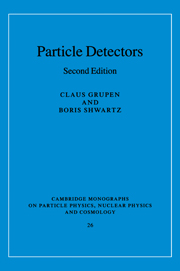Book contents
- Frontmatter
- Contents
- Preface to the second edition
- Preface to the first edition
- Introduction
- 1 Interactions of particles and radiation with matter
- 2 Characteristic properties of detectors
- 3 Units of radiation measurements and radiation sources
- 4 Accelerators
- 5 Main physical phenomena used for particle detection and basic counter types
- 6 Historical track detectors
- 7 Track detectors
- 8 Calorimetry
- 9 Particle identification
- 10 Neutrino detectors
- 11 Momentum measurement and muon detection
- 12 Ageing and radiation effects
- 13 Example of a general-purpose detector: Belle
- 14 Electronics
- 15 Data analysis
- 16 Applications of particle detectors outside particle physics
- Résumé
- 17 Glossary
- 18 Solutions
- Appendix 1 Table of fundamental physical constants
- Appendix 2 Definition and conversion of physical units
- Appendix 3 Properties of pure and composite materials
- Appendix 4 Monte Carlo event generators
- Appendix 5 Decay-level schemes
- Index
15 - Data analysis
Published online by Cambridge University Press: 19 October 2009
- Frontmatter
- Contents
- Preface to the second edition
- Preface to the first edition
- Introduction
- 1 Interactions of particles and radiation with matter
- 2 Characteristic properties of detectors
- 3 Units of radiation measurements and radiation sources
- 4 Accelerators
- 5 Main physical phenomena used for particle detection and basic counter types
- 6 Historical track detectors
- 7 Track detectors
- 8 Calorimetry
- 9 Particle identification
- 10 Neutrino detectors
- 11 Momentum measurement and muon detection
- 12 Ageing and radiation effects
- 13 Example of a general-purpose detector: Belle
- 14 Electronics
- 15 Data analysis
- 16 Applications of particle detectors outside particle physics
- Résumé
- 17 Glossary
- 18 Solutions
- Appendix 1 Table of fundamental physical constants
- Appendix 2 Definition and conversion of physical units
- Appendix 3 Properties of pure and composite materials
- Appendix 4 Monte Carlo event generators
- Appendix 5 Decay-level schemes
- Index
Summary
Without the hard little bits of marble which are called ‘facts’ or ‘data’ one cannot compose a mosaic; what matters, however, are not so much the individual bits, but the successive patterns into which you arrange them, then break them up and rearrange them.
Arthur KoestlerIntroduction
The analysis of data and extraction of relevant results are goals of particle physics and astroparticle physics experiments. This involves the processing of raw detector data to yield a variety of final-state physics objects followed by the application of selection criteria designed to extract and study a signal process of interest while rejecting (or reducing to a known and manageable level) background processes which may mimic it. Collectively, this is referred to as an analysis. Physics analyses are performed either to measure a known physical quantity (e.g. the lifetime of an unstable particle), or to determine if the data are compatible with a physics hypothesis (e.g. the existence of a Higgs boson). At each stage, however, a variety of ‘higher-order’ issues separate particle physics and astroparticle physics analyses from a brute-force application of signal-processing techniques.
Reconstruction of raw detector data
All physics analysis starts from the information supplied from the dataacquisition system, the raw detector data.
- Type
- Chapter
- Information
- Particle Detectors , pp. 436 - 465Publisher: Cambridge University PressPrint publication year: 2008



